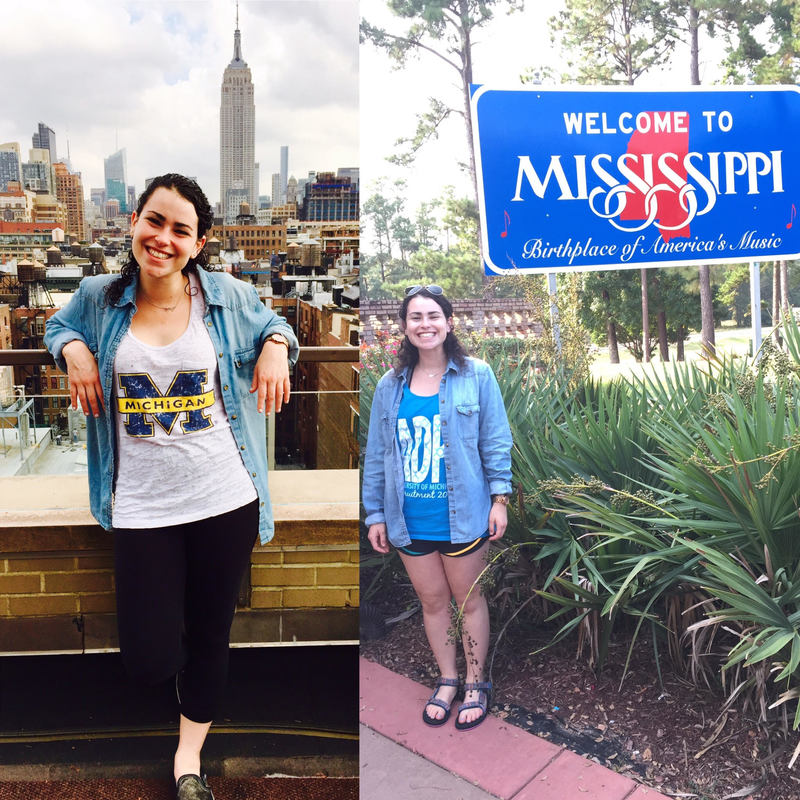Return to Education Newsletter main page! |
What Makes a Southern Jew Different from a Northern Jew?Shira Moskowitz, ISJL Education Fellow
When I tell friends up north that I work at the Goldring/Woldenberg Institute of Southern Jewish Life, I tend to hear the same few questions. There are Jews in the South? Where’s the Institute for Northern Jewish Life? What makes a Southern Jew different from a Northern Jew? That last question always makes me laugh the hardest. Of course, there is very little difference between a Northern Jew and a Southern Jew (besides fried chicken at Shabbat dinner). After all, people are people. However, Southern Jews share a unique experience to which many people from my home state of New York simply cannot relate. On a more personal level, it is an experience that I did not truly understand until I arrived in Jackson almost two years ago. It is this unique shared experience that makes the ISJL so valuable. Over the course of my two years living in the South, I have observed some key differences between Northern and Southern Jewry. Naturally, I can only speak to my personal (albeit limited) experience growing up on Long Island and my travels with the ISJL, but that seems like as good a place as any to start. One of the biggest differences I have noticed is that Jews in the South have to work a lot harder to be Jewish and to raise Jewish children. Because there are significantly more “small” or “isolated” Jewish communities in many Southern cities, congregants need to contribute more to sustaining their community. Many times, small communities in the North at least have lots of Jews around them. But in the South, congregants have to step up to teach religious school and volunteer on committees. Additionally, because there are far fewer Jewish students in any given school district, the school systems are not always accommodating to Jewish holidays and observances. Parents have to make difficult decisions for their children about missing valuable education time or celebrating Jewish holidays and observing mitz’vot. Growing up in New York, this was not something I ever had to worry about, since the public schools closed for major Jewish holidays. On the other hand, the fact that many Southern Jews have to work harder to maintain and grow their Jewish communities lends itself to closer-knit communities. There is a sense of pride that many Southern Jews take in being both Southern and Jewish, and congregants connect to one another through their needed involvement in the synagogue. It is for this reason that some units within the ISJL curriculum are written to reflect the experiences of the Southern Jewish community. We recognize that many of the experiences our Southern congregations face are unique and we want to encourage the conversations in the classroom to feel personally relevant to our students. We discuss issues that are pertinent to Southern Jews such as what it is like to be the only Jew in one’s class or even one’s school, local Civil Rights stories, and events that directly impacted many of our students (for instance Hurricane Katrina). Southern and Northern Jews may have some different experiences; however, we all share the same basic beliefs and practices which connect us not only to each other, but to the rich history of American Jewry. |
- Home
- WHO WE ARE
-
WHAT WE DO
- PODCAST
- Conference >
- Education >
-
CULTURE
>
- Culture Overview
- Cultural Programming >
-
History
>
-
Encyclopedia of Southern Jewish Communities
>
- Alabama Encyclopedia
- Arkansas Encyclopedia
- Georgia Encyclopedia
- Florida Encyclopedia
- Kentucky Encyclopedia
- Louisiana Encyclopedia
- Mississippi Encyclopedia
- North Carolina Encyclopedia
- Oklahoma Encyclopedia
- South Carolina Encyclopedia
- Tennessee Encyclopedia
- Texas Encyclopedia
- Virginia Encyclopedia
- Encyclopedia Credits
- Oral History
-
Encyclopedia of Southern Jewish Communities
>
- SPIRITUALITY >
- DONATE
- Shalom Y'all
- Strategic Plan
- Southern & Jewish Blog
- Calendar
- Virtual Press Kit
|
©2024 Goldring/Woldenberg Institute of Southern Jewish Life
|

